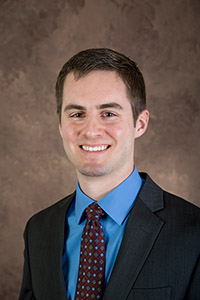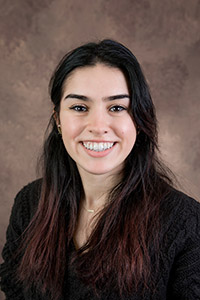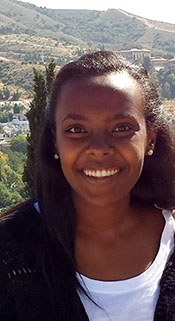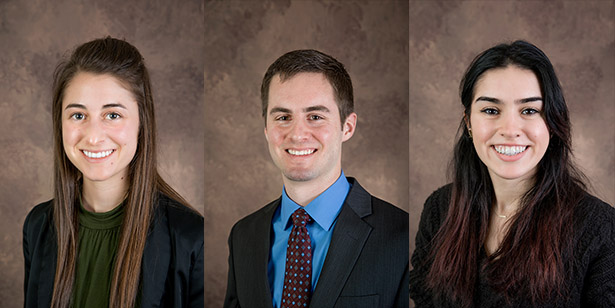FAYETTEVILLE, Ark. – Three University of Arkansas Honors College seniors were named as finalists for the prestigious Gates Cambridge Scholarship. The scholarship funds graduate study at Cambridge University in England.
More than 900 outstanding students from across the country applied for the scholarship, fewer than 100 were chosen as finalists, and they were interviewed in Seattle last week. Forty students will be selected for the award, to be announced later this month.
The U of A finalists are:
- Kimberly Cribbs, Pea Ridge, chemical engineering major, College of Engineering
- Ryan DuChanois, Greenland, civil engineering major, College of Engineering
- Kristen Kent, White Hall, anthropology and biochemistry major, J. William Fulbright College of Arts and Sciences.
“We are very proud of these students and of their accomplishments, not just in being selected as Gates Cambridge finalists, but also in their level of academic success and civic engagement,” said U of A Provost Ashok Saxena. “To be selected as a finalist is an incredible honor — one that each of these talented students has earned through hard work and dedication in the classroom and in communities across the globe. The Gates Cambridge program selects academically stellar students who have exceptional leadership skills and who are dedicated to serving others. Kimberly Cribbs, Ryan Duchanois, and Kristen Kent fit this description perfectly. They are outstanding representatives of their peers, their colleges, the University of Arkansas, and the state.”
The Gates Cambridge Scholarship, established in 2000 by the Bill and Melinda Gates Foundation, awards 95 scholarships every year: 40 to American students, and 55 to international students. Three University of Arkansas students have been named Gates Cambridge Scholars in previous years: Mariel Williams Young in 2013, and David Deitz and Lance Owen in 2006.
Kimberly Cribbs
.jpg) |
| Kimberly Cribbs |
Kimberly Cribbs is interested in expanding access to clean water in developing countries around the world. She researched point-of-use drinking water technologies in South Africa and worked to develop low-cost, sustainable fluoride adsorbent in Ghana, and has presented on her findings at conferences in New Delhi, Washington, D.C. and Saudi Arabia. She is an active member of Arkansas Engineers Abroad and has coordinated with donors and mentors for two of the group’s projects. She helped lead the project to provide the first reliable drinking water infrastructure for the town of More Tomorrow, Belize. She is currently leading the construction-phase of the second project, a rainwater catchment system for Tri Cycle Farms, a non-profit serving the food insecure in Fayetteville.
At Cambridge she plans to study for a master’s degree in engineering for sustainable development and hopes to work as a water, sanitation and hygiene engineer for an international development organization. Her goal is to be a Foreign Service Officer for the U.S. Department of State, where she hopes to “deliver water and sanitation services and mitigate conflicts between countries that share limited water resources.”
RYAN DUCHANOIS
 |
| Ryan DuChanois |
Ryan DuChanois is also concerned with water issues, with his interest starting in his hometown of Greenland. He worked on a project to improve access to safe water, helping to map storm water drainage patterns in order to get a National Pollution Discharge Elimination System Permit from the Environmental Protection Agency. Since then he has worked to provide access to safe water in Ethiopia and South Africa.
In 2014, he was awarded a Greater Research Opportunities Fellowship by the EPA. He is currently studying under Wen Zhang, assistant professor of civil engineering, to develop better ways to reuse and recycle wastewater. DuChanois also works as a peer mentor for the College of Engineering, where he helps freshmen engineering students transition personally and academically into the university.
DuChanois plans to use the Gates Cambridge Scholarship to work on a master’s degree in engineering for sustainable development. He ultimately plans to work on providing sustainable water solutions and combatting water scarcity around the globe.
KRISTEN KENT
 |
| Kristen Kent |
Kristen Kent’s wide-ranging interests have taken her to the Czech Republic, Poland, and Spain, where she developed and strengthened her desire to pursue mutual understanding through education.
At the U of A she volunteers in underserved communities throughout Northwest Arkansas, including the 7 Hills Homeless Day Center, the Elizabeth Richardson Center for Disabled Children, and the Veterans Affairs Medical Center. Kent is the current president of the service organization Gamma Beta Phi.
At Cambridge, she plans to study for a master’s degree in applied biological anthropology. She intends to become a medical doctor and work to promote social justice and health care equality at home and abroad.
MARSHALL SCHOLARSHIP FINALIST
 |
| Ailon Haileyesus |
University of Arkansas Honors student Ailon Haileyesus was a finalist for the Marshall Scholarship this past fall. Haileyesus is a biomedical engineering senior in the College of Engineering. Last year she became the university’s first Harvard-Amgen Scholar, an opportunity that allowed her to take part in a 10-week summer biomedical research program at Harvard University. After completing her education, Haileyesus plans to spend her career developing low-cost health care devices that can be used to improve diagnostics in developing nations.
The Marshall Scholarship provides U.S. students the opportunity to pursue post-graduate study at any United Kingdom institution in any field of study. Up to 40 Marshall Scholars are selected each year based on a combination of academic merit, leadership potential, and ambassadorial potential. The University of Arkansas has had seven Marshall Scholars since the Scholarship was founded in 1953, most recently, Mike Norton in 2013.
About the University of Arkansas: The University of Arkansas provides an internationally competitive education for undergraduate and graduate students in more than 200 academic programs. The university contributes new knowledge, economic development, basic and applied research, and creative activity while also providing service to academic and professional disciplines. The Carnegie Foundation classifies the University of Arkansas among only 2 percent of universities in America that have the highest level of research activity. U.S. News & World Report ranks the University of Arkansas among its top American public research universities. Founded in 1871, the University of Arkansas comprises 10 colleges and schools and maintains a low student-to-faculty ratio that promotes personal attention and close mentoring.
Topics
Contacts
Suzanne McCray, vice provost for enrollment
Director, Office of Nationally Competitive Awards
479-575-4883,
Steve Voorhies, manager, media relations
University Relations
479-575-3583,
